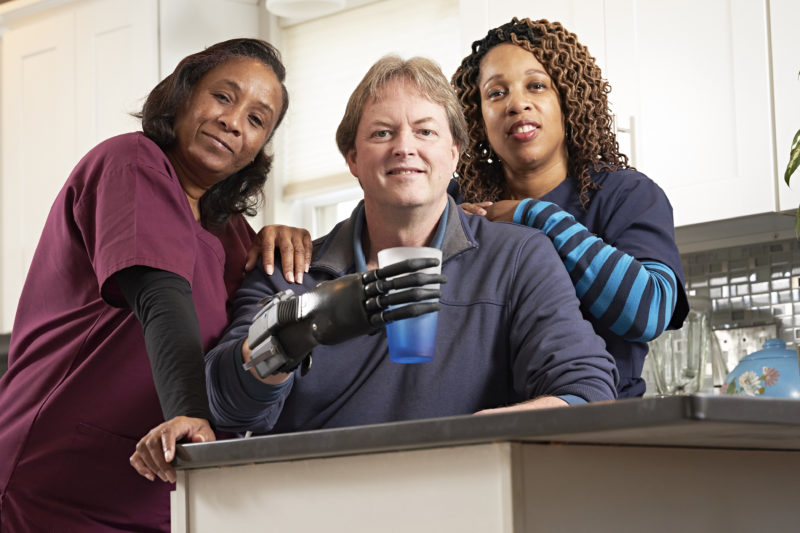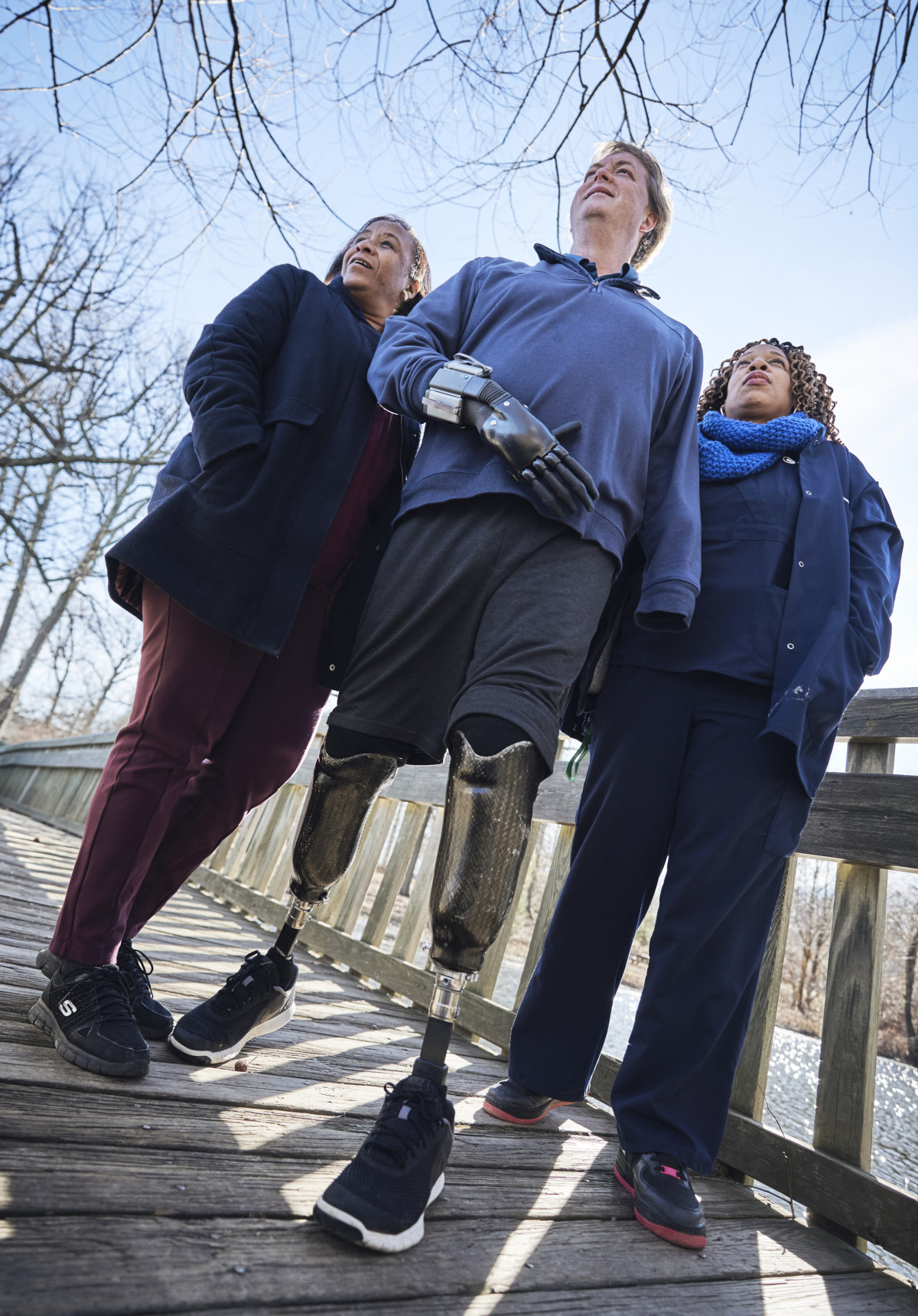Bill Hodgman loves the active life — to take strolls on the beach and peaceful walks in the park, to travel and snorkel. He often wakes before 6 a.m. to greet the day. He keeps a list of things he’d like to do in the future.
His positive approach to life today is far removed from the way he had lived in the several years after an attack of sepsis led to multiple limb amputations.
Sepsis is a potentially life-threatening illness caused by the body’s overactive response to an infection. In mid-April 2014, Hodgman, who has type 2 diabetes, was with his mother and sister when the nearly fatal experience began with flu-like symptoms.
“It was obvious he wasn’t feeling well,” said his mother, Jean. “He complained of pain in his abdominal area and his back. He just didn’t look good.”
His sister, Amy Morris, said she checked his blood glucose and gave him food and insulin to see if that would help him feel better. But after his condition rapidly deteriorated overnight, he needed to go to the emergency department.
A grim prognosis
After the ambulance reached Christiana Care’s Wilmington Hospital, Hodgman’s heart stopped for three minutes, he said. After resuscitating him, the medical team administered vasopressors for severely low blood pressure. For four days, Hodgman was in a coma with a grim prognosis.
On that Easter Sunday, Hodgman’s sons, Eric and Troy, and his friend, Paul McCorkle, thought of playing some music in the hospital room to gauge any effect on his condition. Troy placed a cell phone on Hodgman’s shoulder and put on “The Immigrant Song” by Led Zeppelin. Incredibly, Hodgman began nodding his head, his eyes fluttered open, he mouthed the lyrics and even played air guitar, his family recalled.
There was joy when he came out of the coma, but the illness also took an enormous toll on his body. Sepsis can cause blockages in the blood vessels, depriving body tissue of oxygen. The resulting damage to his limbs led to the eventual amputation of his left arm below the elbow. On his right hand, he lost all but one knuckle of a finger. Both his legs were amputated below the knee.
Hodgman received occupational and physical therapy in the hospital. He then moved to a rehabilitation facility. His body was slowly healing, but his mind was another matter. He had suffered from depression before he fell ill. Afterward, he grieved the loss of his limbs.
“I had no desire to improve things or do anything other than exist,” he said. “This was a new level of depression that lasted months, if not years.”
Since the city house where the family had lived had too many steps, Morris sold it, and they moved to suburban Wilmington. She and her mother have been his primary caregivers, he said.
VNA’s vital role
Hodgman formed tight bonds with his caregivers from the Visiting Nurse Association of Christiana Care. His home health aides Joyce Everett, Melanie Lopez and Tanay Smith, and his nurse, Guirlene Clervoix, MSN, RN, were instrumental in his successful comeback. “They are professional, cheerful and they anticipate my needs,” said Hodgman, who needed help with the most personal of everyday activities, as well as dressing and meal preparation. “They are very mindful and look for changes in my health.”

“He is so much more self-sufficient. Nothing can stop him,” said Clervoix.
His progress has continued — he can do most things for himself that were too difficult not so long ago. Morris recalled when he got up from the dinner table and started walking away.
“You can take in your plate,” his sister called after him. He did. He walks to the bus stop, rides the bus on his own, and walks home from the stop. “He’s an inspiration,” said Morris.
Getting serious about living
Smith, who has a background in fitness, helped Hodgman with his physical therapy. Everett joined him on walks and helped him learn to trust his prosthetic hand and legs.
“They were motivating and encouraging,” he said of his caregivers. His mother Jean calls the VNA’s physical therapists and the nursing caregivers “angels of mercy.”
“He is so much more self-sufficient. Nothing can stop him.”
Guirlene Clervoix, MSN, RN
Visiting Nurse Association of Christiana Care
Nearly four years after the catastrophe, in early 2018, Hodgman said he mentally flipped a switch. “I started getting serious about living. I got out walking and discovered Bellevue State Park was closer than I thought.”
He took other small steps toward a healthy lifestyle. One day he vowed to drink more water. Another day he resolved to cut down on meal portions. He lost 25 pounds, got back onto Facebook and frequently spends time with his friend Paul, who was a steady visitor during Hodgman’s illness. Hodgman’s diabetes is under control, and he now has “zero” depression, he said.
Diving in
In fall 2018, he went with his family to St. Thomas, U.S.V.I. “He was the first up and out,” Morris said. “He walked to the pier, took off his legs, put on his goggles and off he went snorkeling in the water. Out of the six of us, he did the most.”
Hodgman wants to raise awareness for the dangers of sepsis and to help other amputees. He is taking action to work and drive again soon.
“Prior to this happening, he was in a very dark place,” Morris said. “Now he’s a more whole person. He’s quite amazing. He’s doing it.”
“Life,” as Hodgman now likes to say, “is good.”

